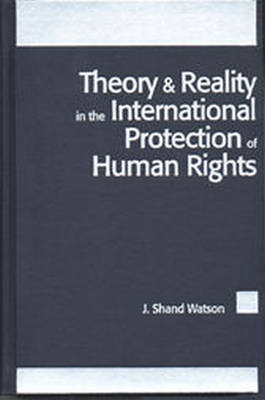
Theory and Reality in the International Protection of Human Rights
Seiten
1999
Transnational Publishers Inc.,U.S. (Verlag)
978-1-57105-097-7 (ISBN)
Transnational Publishers Inc.,U.S. (Verlag)
978-1-57105-097-7 (ISBN)
The author shows how the proponents of the international human rights regime use a legislative mode of reasoning, and how international law cannot sustain this technique. He concludes that the validity of the norms of international human rights has yet to be demonstrated.
Many theories and propositions have been advanced on the tacit assumption that international law encompasses the protection of human rights. Very few, if any, question the validity of this position. Here is a book that does.
Theory and Reality in the International Protection of Human Rights presents a defense of the traditional theory of international law-based on a decentralized nation-state system of international relation—as being more appropriate for the analysis of its subject than more recent variants that allow for supranational redress at an increasingly personal level. In particular, Professor Watson shows how the proponents of the international human rights regime persistently use a legislative mode of reasoning, and how international law cannot sustain this technique. He holds that violation of the right to life is best adjudicated within a customary system, and concludes that the validity of the norms of international human rights has yet to be demonstrated.
Published under the Transnational Publishers imprint.
Many theories and propositions have been advanced on the tacit assumption that international law encompasses the protection of human rights. Very few, if any, question the validity of this position. Here is a book that does.
Theory and Reality in the International Protection of Human Rights presents a defense of the traditional theory of international law-based on a decentralized nation-state system of international relation—as being more appropriate for the analysis of its subject than more recent variants that allow for supranational redress at an increasingly personal level. In particular, Professor Watson shows how the proponents of the international human rights regime persistently use a legislative mode of reasoning, and how international law cannot sustain this technique. He holds that violation of the right to life is best adjudicated within a customary system, and concludes that the validity of the norms of international human rights has yet to be demonstrated.
Published under the Transnational Publishers imprint.
J. Shand Watson is Professor of Law at Mercer University.
Acknowledgments; Preface; Chapter I. The Gap Between Theory and Reality; Chapter II. State Practice and Consent in the Choice of Legal Theory; Chapter III. Coercion, and the Motivation to Comply with Human Rights Norms; Chapter IV. Custom as the True Practice of States; Chapter V. General Assembly Resolutions as a Source of Human Rights; Chapter VI. Treaties, Obligation, and Nonenforcement; Chapter VII. Subsidiary Sources; Chapter VIII. Domestic Jurisdiction versus International Jurisdiction; Chapter IX. Humanitarian Intervention and
Nonenforcement; Chapter X. The Role of Natural Law and Natural Rights; Chapter XI. The Efficacy of Domestic Secondary Norms; Index
| Erscheint lt. Verlag | 1.3.1999 |
|---|---|
| Sprache | englisch |
| Gewicht | 708 g |
| Themenwelt | Recht / Steuern ► EU / Internationales Recht |
| Recht / Steuern ► Privatrecht / Bürgerliches Recht ► Internationales Privatrecht | |
| Sozialwissenschaften ► Politik / Verwaltung | |
| ISBN-10 | 1-57105-097-3 / 1571050973 |
| ISBN-13 | 978-1-57105-097-7 / 9781571050977 |
| Zustand | Neuware |
| Haben Sie eine Frage zum Produkt? |
Mehr entdecken
aus dem Bereich
aus dem Bereich
1. Halbband: §§ 433-480, CISG
Buch | Hardcover (2024)
C.H.Beck (Verlag)
CHF 166,60


